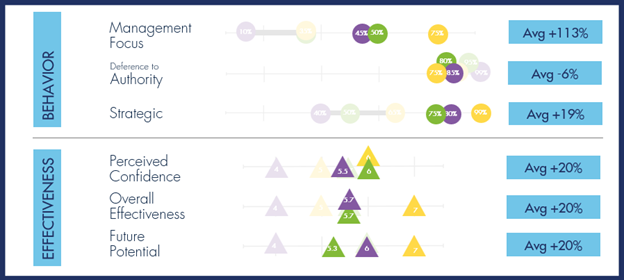
Building Confidence with Behavior-Based Coaching
Building Confidence with Behavior-Based Coaching
Andre: A Leader in Need of Confidence
- Age: 20
- Role: Project Manager at a Transportation Company
- Time with Company: 2.5 years
- Time in Role: 1 year
The Challenge
Andre’s boss saw potential early on that earned him a promotion – but since then, his supervisor has had growing concerns about his leadership abilities. Andre’s team appears disorganized and lacking in direction. Andre seems to be constantly seeking advice from his superiors, creating doubt about his capabilities.
He and his boss mutually agreed that he should undertake coaching to help unlock his potential and improve his effectiveness as a manager. He connected with Christine, an MRG coach based in Portland, Maine.
The Tools
LEA 360™: Measuring 22 discrete leadership behaviors, this tool collects data from the participant (Andre) as well as observers (boss, peers, and direct reports) to reveal a leadership behavior profile. The profile is descriptive rather than evaluative, providing actionable data on how much emphasis leaders place on different behaviors. The 360 data can provide helpful insights into where leaders’ self-perception fails to align with their colleagues’.
LEA Impact Report: A complement to the LEA 360™, the Impact Report includes observer ratings on 32 leadership effectiveness measures. The measures are specific and discrete, providing clear direction for leadership development.
Key Assessment Insights
In their assessment debrief, Christine helped Andre identify three effectiveness measures that he was eager to improve:

They also took a close look at his behavior profile. Andre’s scores on three specific LEA behaviors were of concern in relation to his goals. They agreed that by targeting development of these three behaviors, Andre could demonstrate more effectiveness in his role and feel more confidence and self-assurance as he continues to pursue his professional objectives.

Behavioral Development through Coaching:
Behavior Shift: dial up Management Focus
What is it? Making things happen, being influential; willing to take command; providing guidance to others; taking over a group; acting as a facilitator
Why is Andre struggling? Baggage from a dictatorial former boss made Andre inclined to give others LOTS of space for ideas. But the hands-off approach allowed strong personalities within the team to derail meetings. This left many feeling lost and isolated.
The development checklist:
- Prepare each team meeting carefully with a purpose and a strong agenda.
- Consider input, but then make the call.
- Re-focus team members when they get off track.
- Take responsibility for the performance of the group.
- Provide constructive feedback to naysayers.
Behavior Shift: dial down Deference to Authority
What is it? Valuing the opinions of manager and more senior leaders; demonstrating loyalty to the organization; finding out what superiors expect and want; following the rules
Why is Andre struggling? New in his role, he was eager to please those senior to him. So he was hesitant to act without asking or to share strong opinions – leaving his boss and others feeling like he needed constant support and wasn’t leadership material.
The development checklist:
- Before meeting with superiors, prepare a plan to present to them.
- Anticipate objections and push back (gently).
- Identify where to ask forgiveness rather than permission.
- Practice using persuasive language to state his case.
Behavior Shift: dial up Strategic
What is it? Planning for the future; thinking ahead; assessing the long-term implications of decisions; objectively analyzing options and opportunities
Why is Andre struggling? Though Andre did spend time planning and thinking ahead, he was not great about sharing those ideas with others. Additionally, he was using his strategic mindset on business initiatives only, but not on his own career advancement.
The development checklist:
Christine and Andre agreed that he would set up a “Personal Strategy Summit” each week, asking himself the following questions:
- What important meetings are coming up? How can I prepare for them? When will I prepare for them?
- What expertise do I need to bring to them – how and when will I get it?
- Do I have an opportunity to lead in these meetings? Or to redirect?
- What ideas am I pushing for, and how can I make them convincing?
- What objections might I encounter, and how can I push back?
Outcome and Progress
Andre worked with Christine for six months, with clear qualitative and quantitative improvement. His boss acknowledged improvements in his leadership skills. Two years from the start of the coaching engagement, Andre retook the LEA 360 assessment as part of a leadership development program. The results were remarkable:

Andre’s Management Focus scores increased by an average of 113%, with his boss’s rating jumping from 35 to 75. This showed significant growth in his ability to provide direction and lead his team effectively. His Deference to Authority decreased by 6%, reflecting a growing confidence in his decision-making and independence. And his Strategic scores increased by 19%, demonstrating his ability to share his ideas more openly and align them with the organization’s goals.
Perhaps even more relevant, his scores on the Leadership Effectiveness Questionnaire also showed notable improvements. His confidence scores improved by 20%, a clear indication that Andre was now seen as a more capable and self-assured leader. Both his Overall Effectiveness and Future Potential scores increased by 20%, with his boss’s rating of Andre’s overall effectiveness jumping from a 5 to a perfect 7, the highest possible score, indicating exceptional leadership.
The Results
His superiors took notice of his behavior shifts, and his overall reputation within the organization shifted. He was soon being considered for further promotions. His journey from an uncertain manager to a confident leader demonstrated the value of focused, data-informed coaching and with a developmental strategy based on behavioral change.
While confidence is sometimes perceived as an innate quality, Andre’s developmental journey provides evidence that self-assurance can be coached. One helpful strategy may be to target the development of specific behaviors – a more concrete and actionable approach than asking leaders to change the way they think or feel, which can be a much bigger challenge.
With behavior-based coaching, we can help leaders make the external, observable and measurable changes that lead to lasting, internal growth.